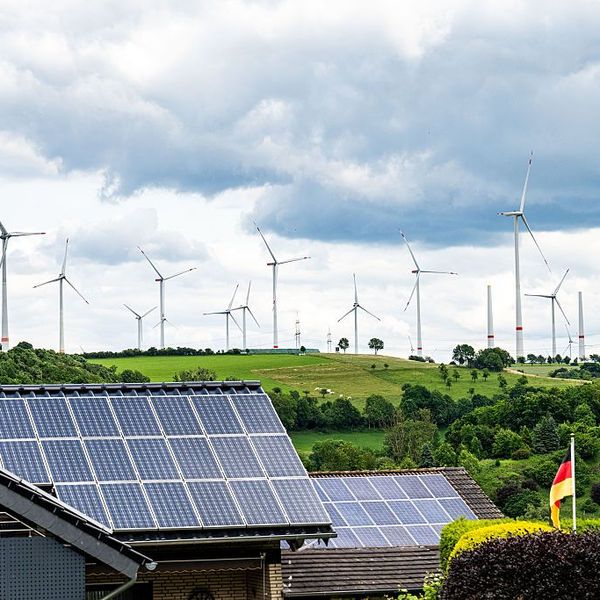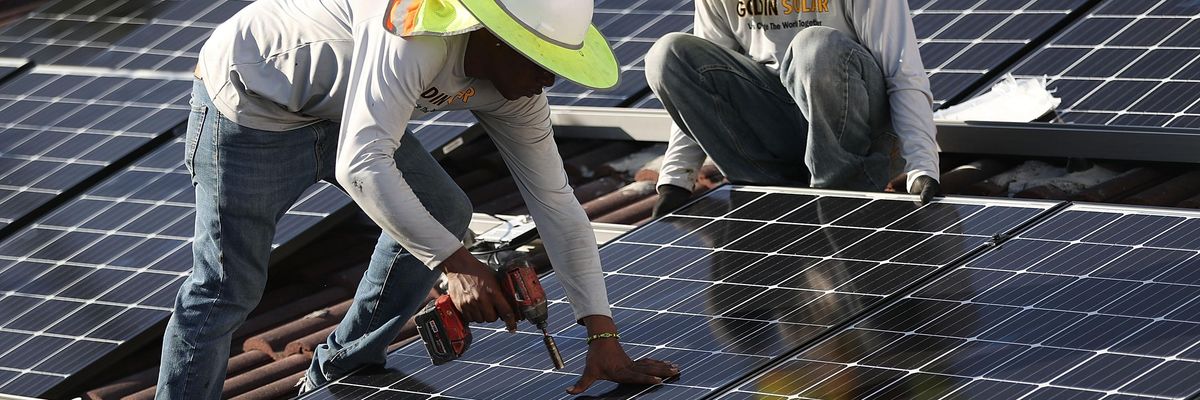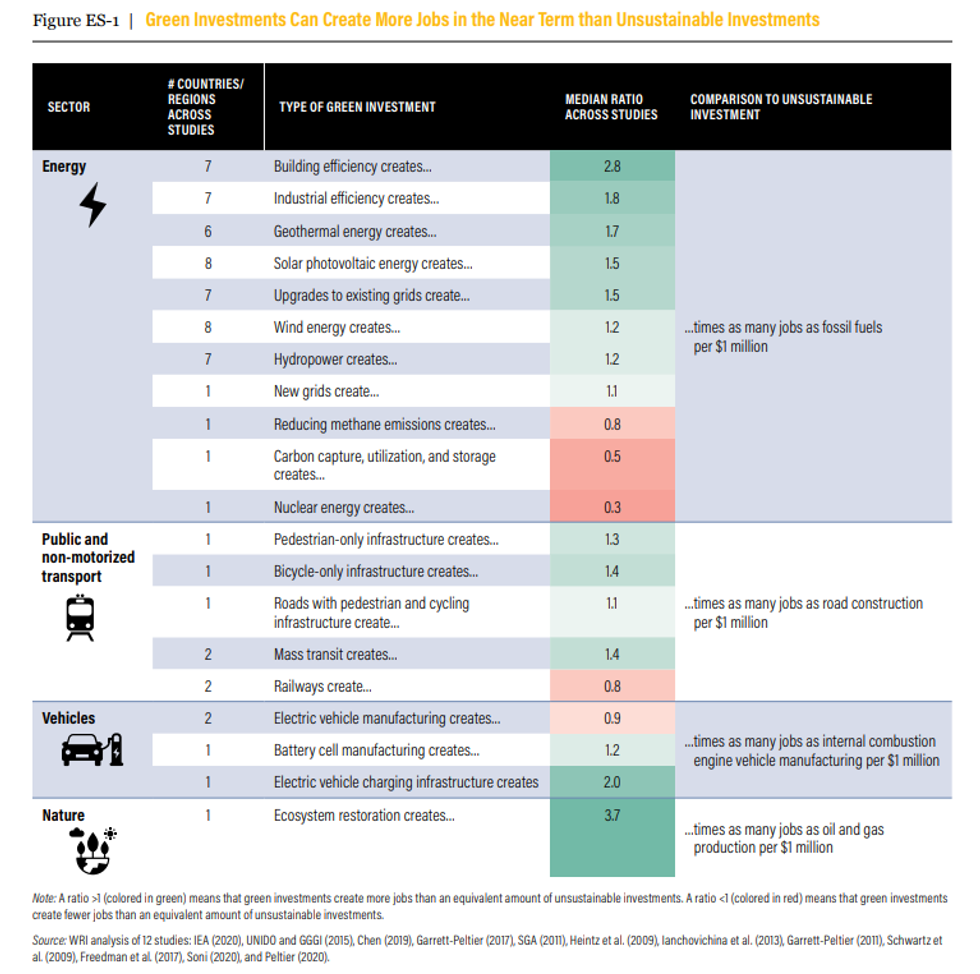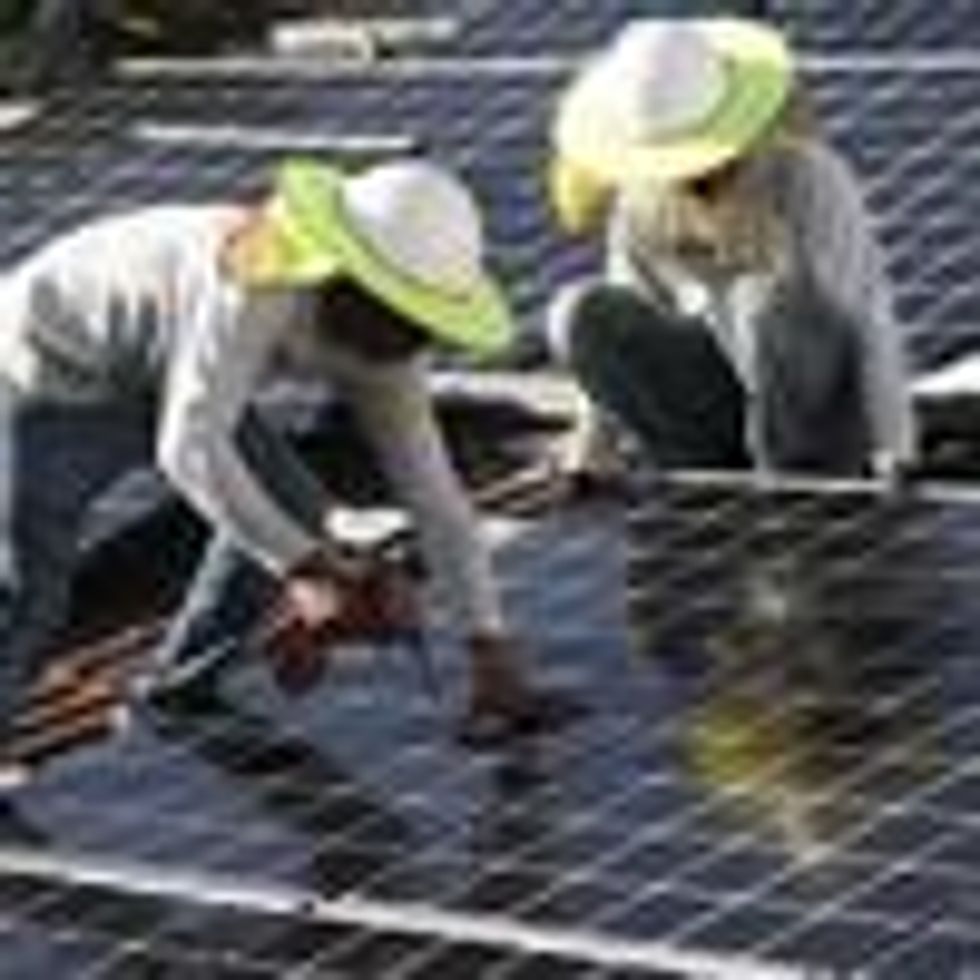As congressional Democrats reassess the Build Back Better Act's climate provisions after right-wing Democratic Sen. Joe Manchin, an unabashed coal profiteer, vowed to gut a key clean electricity program, new research out Monday confirms that green public spending yields more jobs than unsustainable investments--for Manchin's constituents in West Virginia and for workers around the world.
"Continuing to funnel money to unsustainable infrastructure rather than green infrastructure doesn't make sense for the climate, but it also doesn't make sense for workers."
If the U.S. government provides $1 million to fund energy efficiency and renewable energy production, it will generate nearly three times as much employment as it would have created had it used the same amount of money to keep subsidizing the planet-wrecking oil and gas industries, according to an analysis by the World Resources Institute, New Climate Economy, and the International Trade Union Confederation.
For the U.S., the ratio of direct and indirect jobs created in clean energy versus dirty energy per $1 million spent is consistent across several green sectors: 2.7 times more solar jobs, 2.8 times more wind jobs, and 2.9 times more building efficiency jobs than fossil fuel jobs.
Although specific results vary by country, the general trend is consistent worldwide; the one caveat is that for certain kinds of investments, such as sustainable transportation and ecosystem restoration, there was less global data, but available evidence still shows the job advantages of green public spending.
The paper reviewed a dozen studies published between 2009 and 2020 to compare job creation per dollar invested in various types of green infrastructure versus unsustainable infrastructure in Brazil, China, Germany, Indonesia, South Africa, South Korea, the U.S., and globally.
Researchers found that on average:
- Investing in solar PV creates 1.5 times as many jobs as fossil fuels per $1 million;
- Building efficiency creates 2.8 times as many jobs as fossil fuels per $1 million;
- Mass transit creates 1.4 times as many jobs as road construction per $1 million; and
- Ecosystem restoration creates 3.7 times as many jobs as oil and gas production per $1 million.
"If you want economic stimulus, green investments are a better option," Joel Jaeger, a researcher at the World Resources Institute and lead author of the report, told HuffPost. "Continuing to funnel money to unsustainable infrastructure rather than green infrastructure doesn't make sense for the climate, but it also doesn't make sense for workers. So there is a win-win opportunity here."
While environmentally friendly public spending creates more jobs than diverting taxpayer funds to unsustainable industries, the paper explores how to ensure that green jobs are good jobs, given that high-quality employment "is not guaranteed."
Related Content
Infrastructure Plan With Major Climate Investments Would Create 26 Million Jobs: Report
Kenny Stancil
"In developing countries," the paper notes, "green jobs can provide avenues out of poverty, but too many are informal and temporary, limiting access to work security, safety, or social protections. In developed countries, new green jobs may have wages and benefits that aren't as high as those in traditional sectors where, in many cases, workers have been able to fight for job quality through decades of collective action."
However, "with the right policies, it is possible to improve job quality in climate-friendly sectors and the wider economy and enable a just transition," the paper argues, adding:
Governments should work with unions and employers to advance policies and practices that ensure fair wages and working conditions and target hiring of excluded social groups as conditions for public investment and procurement. They should invest in job training to help current workers build new skills and apprenticeship programs to ensure workers can move up the training and career ladder. They should invest in and help renew communities going through job transition or displacement. Governments should support job quality across the entire economy by implementing regulations like minimum wages and labor standards; strengthening social safety nets to support workers when emergencies like Covid-19 arise; and investing in the care economy, public health, and education to build a healthy and skilled workforce.
Jason Walsh, executive director of the BlueGreen Alliance, a coalition of labor unions and environmental groups, told HuffPost that the findings "will absolutely resonate with the labor movement."
Marcela Mulholland, political director at Data for Progress, meanwhile, told the news outlet that "this new research further proves what folks in the climate movement have long argued: Investments in our climate and environment are indeed good for the economy."
"At a time when polling shows that voters have increased concerns about jobs and climate," she added, "it's really a no-brainer for the federal government to prioritize green investments to put our economy back on track. It's good politics and good policy."





